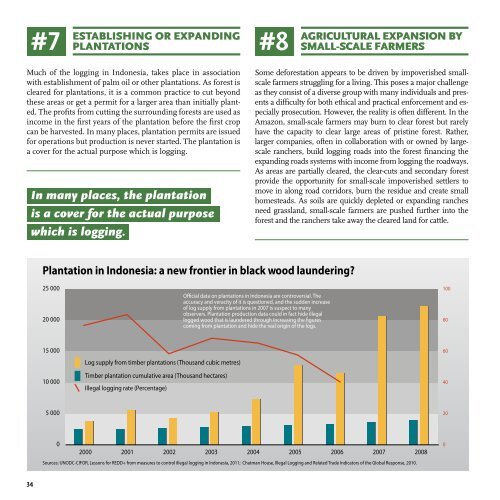Green Carbon, Black Trade - UNEP
Green Carbon, Black Trade - UNEP
Green Carbon, Black Trade - UNEP
You also want an ePaper? Increase the reach of your titles
YUMPU automatically turns print PDFs into web optimized ePapers that Google loves.
ESTABLISHING PLANTATIONS<br />
OR EXPANDING<br />
#7 #8<br />
AGRICULTURAL EXPANSION BY<br />
SMALL-SCALE FARMERS<br />
Much of the logging in Indonesia, takes place in association<br />
with establishment of palm oil or other plantations. As forest is<br />
cleared for plantations, it is a common practice to cut beyond<br />
these areas or get a permit for a larger area than initially planted.<br />
The profits from cutting the surrounding forests are used as<br />
income in the first years of the plantation before the first crop<br />
can be harvested. In many places, plantation permits are issued<br />
for operations but production is never started. The plantation is<br />
a cover for the actual purpose which is logging.<br />
In many places, the plantation<br />
is a cover for the actual purpose<br />
which is logging.<br />
Some deforestation appears to be driven by impoverished smallscale<br />
farmers struggling for a living. This poses a major challenge<br />
as they consist of a diverse group with many individuals and presents<br />
a difficulty for both ethical and practical enforcement and especially<br />
prosecution. However, the reality is often different. In the<br />
Amazon, small-scale farmers may burn to clear forest but rarely<br />
have the capacity to clear large areas of pristine forest. Rather,<br />
larger companies, often in collaboration with or owned by largescale<br />
ranchers, build logging roads into the forest financing the<br />
expanding roads systems with income from logging the roadways.<br />
As areas are partially cleared, the clear-cuts and secondary forest<br />
provide the opportunity for small-scale impoverished settlers to<br />
move in along road corridors, burn the residue and create small<br />
homesteads. As soils are quickly depleted or expanding ranches<br />
need grassland, small-scale farmers are pushed further into the<br />
forest and the ranchers take away the cleared land for cattle.<br />
Plantation in Indonesia: a new frontier in black wood laundering?<br />
25 000<br />
20 000<br />
Official data on plantations in Indonesia are controversial. The<br />
accuracy and veracity of it is questioned, and the sudden increase<br />
of log supply from plantations in 2007 is suspect to many<br />
observers. Plantation production data could in fact hide illegal<br />
logged wood that is laundered through increasing the figures<br />
coming from plantation and hide the real origin of the logs.<br />
100<br />
80<br />
15 000<br />
10 000<br />
Log supply from timber plantations (Thousand cubic metres)<br />
Timber plantation cumulative area (Thousand hectares)<br />
Illegal logging rate (Percentage)<br />
60<br />
40<br />
5 000<br />
20<br />
0<br />
2000 2001 2002 2003 2004 2005 2006 2007 2008<br />
Sources: UNODC-CIFOR, Lessons for REDD+ from measures to control illegal logging in Indonesia, 2011; Chatman House, Illegal Logging and Related <strong>Trade</strong> Indicators of the Global Response, 2010.<br />
0<br />
34
















